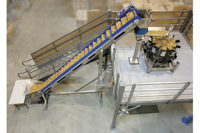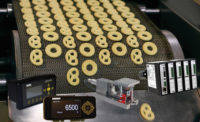When it comes to weighing technology, scale manufacturers are incorporating numerous advances beneficial to bakers and snack producers into their equipment. This brings added functionality to the equipment—and helps bring it in line with today’s top concerns, including food safety and improved processing efficiency.
Safety first
New hygienic designs for weighing technology facilitate easy and thorough cleaning, reducing the risk of contamination and cross-contamination and enabling bakers and snack manufacturers to address food-safety regulations and sustainability initiatives.
“Scales must contain stainless steel pans, sealed keypads, housing and indicators that can be easily wiped clean,” says Tom Storey, director of marketing, Adam Equipment Co., Danbury, CT. “Scales with removable pans are easier to wash thoroughly. This eliminates the chance of microscopic food particles remaining on the pan, which can foster bacteria growth.”
Scales are also designed to resist higher pressure water ingress. “We’ve also designed a heavy-duty load cell to tolerate rough handling by sanitation crews,” says Brian Kennedy, general manager, OEM sales, Yamato Dataweigh, Mequon, WI. “Our new Alpha Advance includes thicker-gauge metal on the buckets and stainless steel plates over the actuators for improved sanitation.”
Heat and Control Inc., Hayward, CA, offers scales that are built to RoHS (Restriction of Hazardous Substances) standards. Circuit boards have a lead-free finish, and the weigher contains no mercury, cadmium or hexavalent chromium. Gaskets and seals are made from FDA-approved materials.
“We also offer a nonstick, antimicrobial coating on new Ishida weighers and replacement parts,” says Brian Barr, sales manager for packaging systems, Heat and Control. “The KleenCoat coating reduces the accumulation of seasonings on weigher radial feeders and conveyor pans in snack food applications, which reduces cleaning costs.”
WeighPack Systems Inc., Montreal, is seeing a lot of interest in linear net weighing, says Christie Taraborelli, marketing manager. “Linear scales are typically quicker to change over and clean, and are more affordable than combination weighing technology,” she explains.
WeighPack recently unveiled the PrimoLinear V5 expandable scale, which allows users to purchase a single lane and add more as needed. As customers’ businesses grow, they simply plug in a new lane, which the 360 software detects and automatically sets up.
Easy, accurate, computerized
Today’s scales and weighers are easier to set up, operate and maintain than their predecessors, reducing user training and changeover time. Many units also offer wireless access for remote operation.
“Machine operators are busier than ever, so Ishida has enhanced its operator interface to simplify machine setup, maintenance and operation,” says Barr. “Ishida RV weighers allow one to control operation and view statistics via an Android-based tablet and smartphone. Diagnostics can be performed from remote locations.”
The C2325 Case Scale from Mettler-Toledo, Ithaca, NY, provides an easy-to-use and economical solution to the challenge of checkweighing larger (up to 50 kilograms) packages, the manufacturer reports. A color touch screen guides the operator through initial product setup and changeovers to optimize uptime and simplify training. Password-protected access for operators and supervisors ensures the security of the user’s proprietary product and process information.
One hundred package memory locations on the controller’s touch screen reportedly make changeovers quick and easy. The control system also can sort out-of-tolerance packages, and communicate the weight data to meet end users’ specific product inspection needs.
Exact measurements are crucial for bakers and snack producers, too. “Any weight discrepancy will affect the nutritional value of single-serve packs,” says Kennedy. The company’s Yamato Frontier technology F518SV runs at high speeds (180 weighments per minute), while gently handling product. For low-count applications, Yamato has a reject and recirculation system that measures low-count (or low-weight) applications.
Computer-based data collection provides many benefits within the weighing process. For example, Adam Equipment’s recently introduced Adam DU (Data Utility) software allows users to quickly capture data from any Adam device with a RS-232 or USB connection. The software collects information from up to eight balances simultaneously, while monitoring, configuring and customizing data to users’ requirements.
“Adam DU can provide basic remote control of the balance, in addition to graphing data and exporting the readings to other applications,” says Storey. “From there, the figures can be stored, saved and analyzed. Users can perform statistical analysis of readings and capture custom data because Adam DU supports up to six additional user-defined data fields.”
Double time
As bakers’ and snack manufacturers’ sales increase, so does their need for equipment that can handle more and different types of products.
The Ishida 218WB-OV double multihead weigher from Heat and Control delivers up to 280 wpm and seamless integration with two bag makers. This provides a dual-snack packaging system that requires about 30 percent less space than two single weigher/bag maker systems and can simultaneously make two different packages. Ishida also introduced the RV-232B 32-head weigher, which is capable of 440 wpm and blends up to eight products.
Sydney-based tna offers the tna intelli-weigh 0328 omega multihead twin scale, which can handle 200 weighs per scale and up to 400 weighs per twin scale, depending on the application. Individually adjustable collating chutes allow for high-speed discharge, flexibility and enhanced product diversity, making the system suitable for large production lines and complicated application mixtures. An inspection wizard highlights periodic preventive maintenance routines.
“With the tna intelli-weigh 0328 omega, we are able to extend our offering of twin scales to our tna intelli-weigh omega series, enabling food manufacturers to achieve higher levels of productivity with the benefits of two high-speed single tubes in a twin format, all while decreasing power consumption,” says Michael Green, managing director for the company. “In addition, bakery and snack food producers can simultaneously produce two bag sizes and formats.”
Kliklok-Woodman, Decatur, GA, partners with original equipment manufacturers (OEMs) of scales and volumetric filling systems. T. Ross Long, executive vice president, says the company’s focus has been on tighter and more seamless integration between filling systems and bag makers. “For example, we recently introduced single point control across our range of machinery with Yamato scales and Spee-Dee (Sturtevant, WI) volumetric fillers,” he explains. “On the Spee-Dee fillers, we integrate machine logic control and servo drives within our bag maker. With the Yamato scales, we focus on optimized parabolic product transfer chutes resulting in higher speeds and low packaging waste.”
The latest generation of combination scales features improved and simplified operator interface, together with higher-standard sanitation design, according to Long. He adds that Kliklok-Woodman is evaluating alternative filling systems, such as servo-control volumetric cup fillers for applications where scales were once the only option. “These applications include many crackers and extruded snack products,” he adds. “Volumetric filling may offer higher overall efficiencies with minimal to no loss in accuracy.”
Whatever form they may take in the future, accurate weighing systems will continue to help bakers and snack producers address their most demanding and constant challenges: improving public health, consumer safety and productivity in a competitive market.










